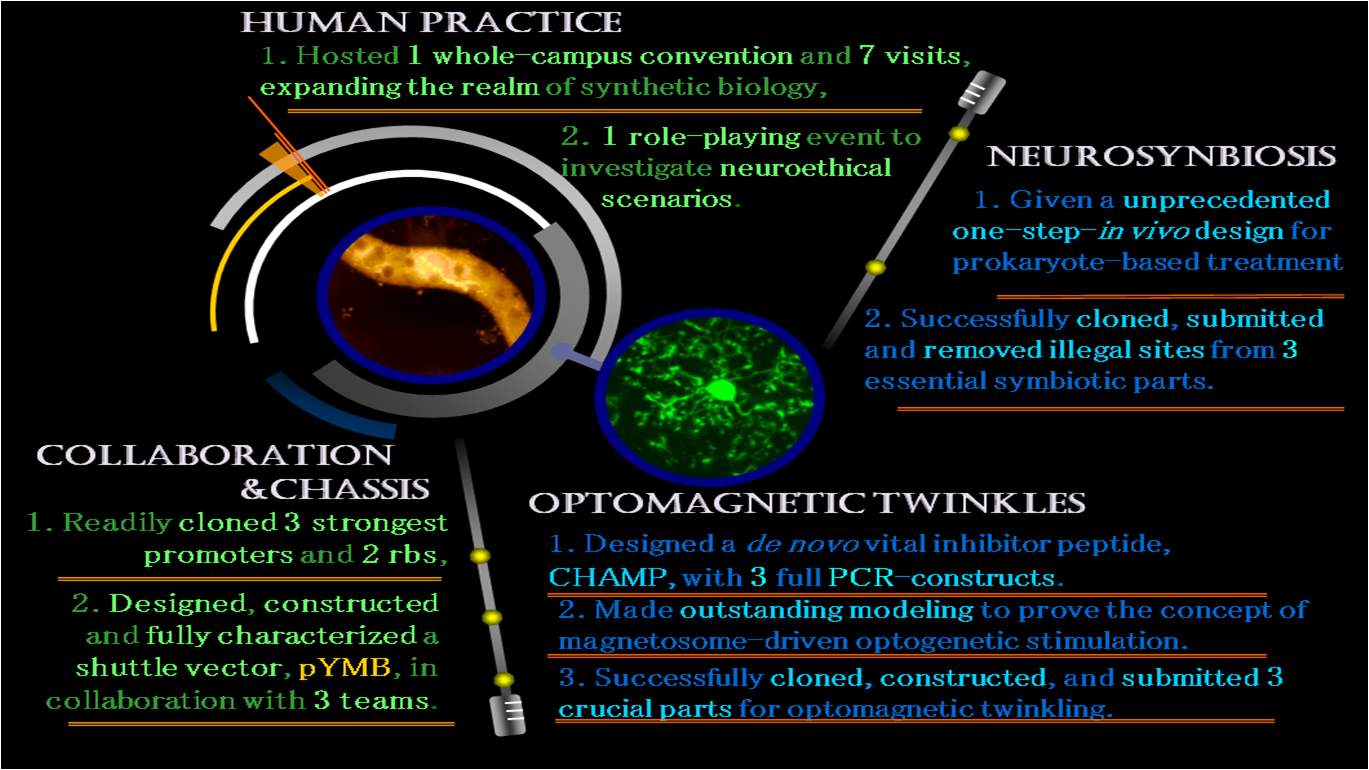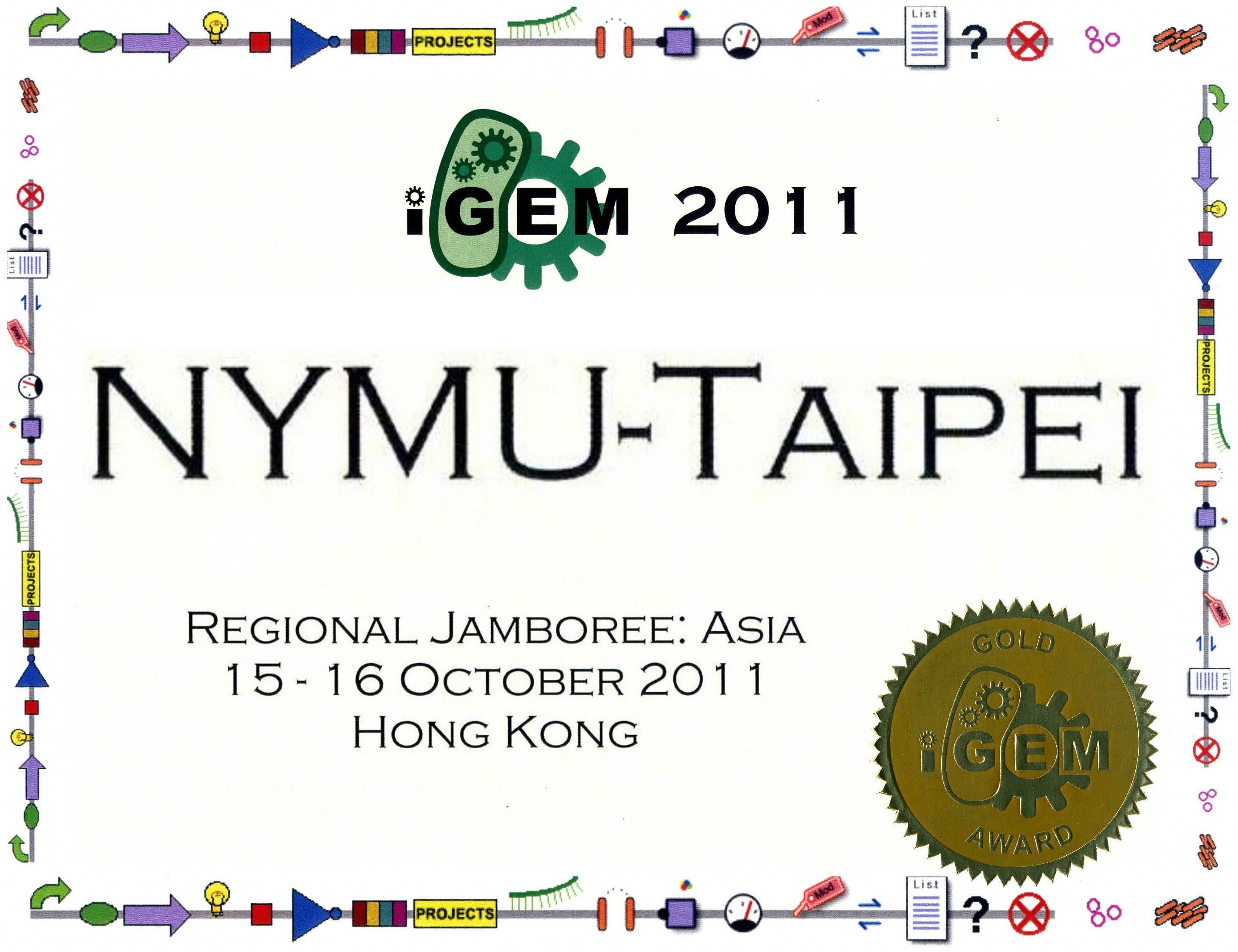Team:NYMU-Taipei
From 2011.igem.org
(→Tailoring Your Avatar ...) |
|||
| (113 intermediate revisions not shown) | |||
| Line 1: | Line 1: | ||
{{:Team:NYMU-Taipei/Templates/Header/menubar}} | {{:Team:NYMU-Taipei/Templates/Header/menubar}} | ||
| + | <html><style>.toc, #toc { display: none; }</style></html> | ||
| + | =<font size=5><font color=crimson>'''Tailoring Your Avatar'''</font></font>= | ||
| - | |||
| - | |||
| - | |||
| - | |||
| - | |||
| - | |||
| - | |||
| - | + | =='''<font size=4><font color=green>Goal</font></font>'''== | |
| - | <font size= | + | <font size=3>Create <b>wireless neuro-stimulator</b>, focusing on achieving remote neuro-stimulation to minimize invasion and damage to the neuron.</font> |
| - | + | =='''<font size=4><font color=green>Why Do We Want to Do That?</font></font>== | |
| - | + | ||
| - | + | ||
| - | + | ||
| - | </font> | + | |
| - | --- | + | <font size=3><b>Optogenetics</b>, the latest neuroscientific method, has improved specificity for stimulating certain cell types of neurons, reversible bi-directional stimulation, and elevated spatiotemporal precision. However, to achieve neuronal network stimulation, light cables are still needed, leaving long-standing annoying issues regarding immune responses unresolved. </font> |
| - | <html> | + | |
| + | |||
| + | |||
| + | =='''<font size=4><font color=green>Specific Aims</font></font>'''== | ||
| + | |||
| + | <font size=4><font color=mediumblue>'''(1) Wireless stimulation for neurons'''</font></font> | ||
| + | |||
| + | <font size=4><font color=mediumblue>'''(2) Minimization of neuro-immuno response'''</font></font> | ||
| + | |||
| + | <center><html> | ||
<iframe width="450" height="349" src="http://www.youtube.com/embed/uB66Q4JP6P0?hl=zh&fs=1" frameborder="0" allowfullscreen></iframe> | <iframe width="450" height="349" src="http://www.youtube.com/embed/uB66Q4JP6P0?hl=zh&fs=1" frameborder="0" allowfullscreen></iframe> | ||
| - | </html> | + | </html></center> |
| - | + | ||
| - | + | =='''<font size=4 color=green>Our Design</font>'''== | |
| - | + | ||
| - | + | <font size=3> | |
| + | |||
| + | To achieve this goal, we use a species of magnetic bacterium,'' Magnetospirillum magneticum'' AMB-1. We have chosen <b>mms13</b>, a transmembrane protein as our target for protein design in this bacterium, as it serves as a linker between reception of wireless magnetic field and optogenetic neuro-stimulation output. Regarding the neuroimmune response, we have utilized three genes to achieve <b>neurosymbiosis</b> within glial cells: <b>''MinC''</b>, a division inhibitor, <b>''INV''</b>, a gene for invasion and <b>''LLO''</b>, a gene for facilitating escapes from phagosomes.</font> | ||
| + | |||
| + | '''<font size=3>Our design is made up of the following two devices:</font>''' | ||
| + | |||
| + | [https://2011.igem.org/Team:NYMU-Taipei/optomagnetic-design <font size=4><font color=mediumblue>'''(1) <u>Optomagnetic Design</u>'''</font></font>] | ||
| + | |||
| + | <font size=3>Bridging magnetics and optogenetics.</font> | ||
| + | |||
| + | [https://2011.igem.org/Team:NYMU-Taipei/immunological-solution <font size=4><font color=mediumblue>'''(2)<u> NeuroSymbiosis</u>'''</font></font>] | ||
| + | |||
| + | <font size=3>Enabling magnetotactic bacteria to be neurosymbiosis with glia cells.</font> | ||
| + | =='''<font size=4><font color=green>3D Deep Brain Stimulation model</font></font>'''== | ||
| + | |||
| + | <center><html><object width="640" height="480"><param name="movie" value="http://www.youtube.com/v/hEfjD3TNE6A?version=3&hl=zh_TW"></param><param name="allowFullScreen" value="true"></param><param name="allowscriptaccess" value="always"></param><embed src="http://www.youtube.com/v/hEfjD3TNE6A?version=3&hl=zh_TW" type="application/x-shockwave-flash" width="640" height="480" allowscriptaccess="always" allowfullscreen="true"></embed></object></html> | ||
| + | </center> | ||
| + | |||
| + | =='''<font size=4><font color=green>Summary of Our Achievements</font></font>'''== | ||
| + | <font size=3> | ||
| + | <center>[[image:Achievement.png|900px|]]</center> | ||
| + | </font> | ||
| + | |||
| + | =='''<font size=4><font color=green>Our Institute</font></font>'''== | ||
| + | <font size=4 color=mediumblue>'''(1) The official web sites of our school - National Yang Ming University (NYMU):'''</font> | ||
| + | |||
| + | [http://web.ym.edu.tw/front/bin/home.phtml <font size=3 color=black><u>in Chinese</u></font>] | ||
| + | |||
| + | [http://nymu-e.web.ym.edu.tw/front/bin/home.phtml <font size=3 color=black><u>in English</u></font>] | ||
| + | |||
| + | <font size=4 color=mediumblue>'''(2) Follow the two links below to see The Beauty of NYMU'''</font> | ||
| + | |||
| + | [http://issue.ym.edu.tw/cia/new/ <font size=3 color=black><u>Take a panoramic scenery view of our university</u></font>] | ||
| + | |||
| + | [http://issue.ym.edu.tw/cia/new/tw/ym720.html <font size=3 color=black><u>Take a tour of our university</u></font>] | ||
| + | |||
| + | <center>[[file:nymutaipei2.jpg|400px|]]</center> | ||
| + | |||
| + | |||
| + | |||
| + | <center>[[Image:Sponsor 2011igem NYMU-Taipei.png]]</center> | ||
Latest revision as of 03:12, 7 December 2011

Contents |
Tailoring Your Avatar
Goal
Create wireless neuro-stimulator, focusing on achieving remote neuro-stimulation to minimize invasion and damage to the neuron.
Why Do We Want to Do That?
Optogenetics, the latest neuroscientific method, has improved specificity for stimulating certain cell types of neurons, reversible bi-directional stimulation, and elevated spatiotemporal precision. However, to achieve neuronal network stimulation, light cables are still needed, leaving long-standing annoying issues regarding immune responses unresolved.
Specific Aims
(1) Wireless stimulation for neurons
(2) Minimization of neuro-immuno response
Our Design
To achieve this goal, we use a species of magnetic bacterium, Magnetospirillum magneticum AMB-1. We have chosen mms13, a transmembrane protein as our target for protein design in this bacterium, as it serves as a linker between reception of wireless magnetic field and optogenetic neuro-stimulation output. Regarding the neuroimmune response, we have utilized three genes to achieve neurosymbiosis within glial cells: MinC, a division inhibitor, INV, a gene for invasion and LLO, a gene for facilitating escapes from phagosomes.
Our design is made up of the following two devices:
Bridging magnetics and optogenetics.
Enabling magnetotactic bacteria to be neurosymbiosis with glia cells.
3D Deep Brain Stimulation model
Summary of Our Achievements

Our Institute
(1) The official web sites of our school - National Yang Ming University (NYMU):
[http://web.ym.edu.tw/front/bin/home.phtml in Chinese]
[http://nymu-e.web.ym.edu.tw/front/bin/home.phtml in English]
(2) Follow the two links below to see The Beauty of NYMU
[http://issue.ym.edu.tw/cia/new/ Take a panoramic scenery view of our university]
[http://issue.ym.edu.tw/cia/new/tw/ym720.html Take a tour of our university]


 "
"





